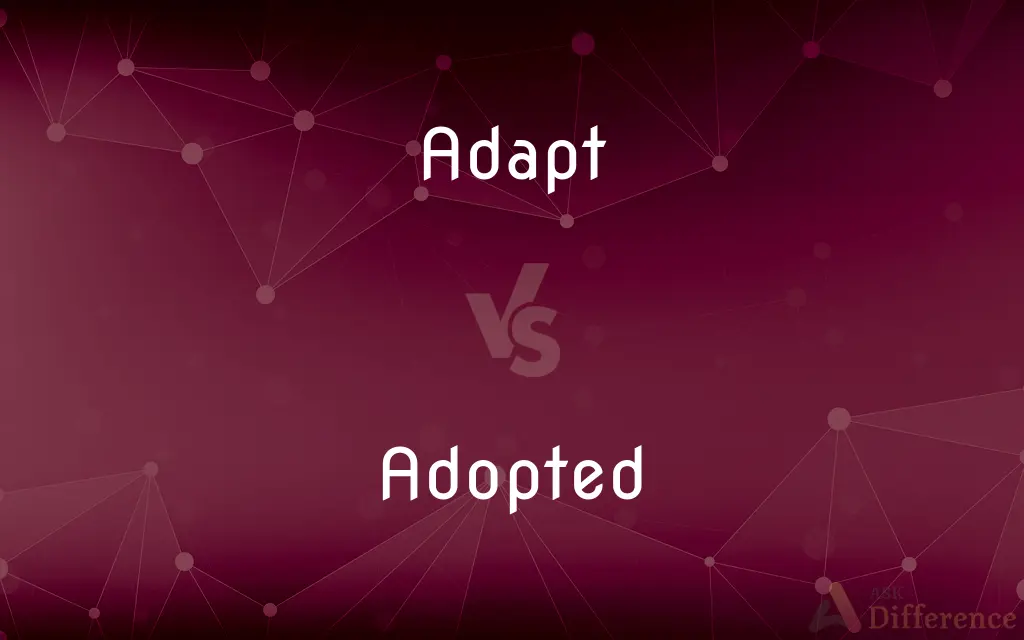Adapt vs. Adopted — What's the Difference?
By Fiza Rafique & Urooj Arif — Updated on May 5, 2024
Adapt involves modifying something for new conditions or uses, while adopted refers to legally taking another's child as one's own.

Difference Between Adapt and Adopted
Table of Contents
ADVERTISEMENT
Key Differences
Adapt is the process of changing or modifying something to better suit new conditions or environments. This could be adapting a device, idea, or behavior to improve functionality or efficiency. On the other hand, adopted pertains to the legal process where an individual or couple becomes the legal parents of a child that is not biologically theirs.
In the biological context, adapt refers to the evolutionary process by which organisms change over time in response to changes in their environment. Whereas, adopted has no biological implications but is a legal and social term relating to family and child-rearing.
To adapt a novel into a film, filmmakers alter parts of the story to better fit the cinematic form, focusing on visual storytelling and condensing narratives. On the other hand, when a child is adopted, there is a legal transfer of parental rights from the biological parents to the adoptive parents.
Businesses often adapt their strategies to meet changing market conditions or to leverage new technologies, thereby ensuring competitiveness and relevance. Conversely, families might choose to adopt a child, thereby expanding their family and providing a home to someone in need.
Adaptation can also occur in technology, where software or hardware is modified to improve performance or to be compatible with different operating systems. Adopted, however, is used specifically in the context of adopting ideas, practices, or policies, not just children, implying a full and often permanent integration into new settings.
ADVERTISEMENT
While adaptation is typically a continuous and ongoing process, requiring adjustments to maintain or improve efficacy or relevance, adoption is generally a one-time, formal act that establishes a new permanent relationship or agreement.
Comparison Chart
Definition
Modify for new use or function
Legally take another's child as one's own
Context
Biological, technological, cultural
Legal, familial
Process
Ongoing and evolutionary
One-time, formal
Examples
Adapting a book into a movie, business strategies
Adopting a child, adopting new policies
Outcome
Improved functionality or survival
Establishment of new permanent relationships
Compare with Definitions
Adapt
To modify something to suit new conditions.
Scientists adapt old theories to fit new evidence.
Adopted
To embrace or start using something new.
The company adopted a new software system for project management.
Adapt
To alter a story or idea for different media.
The director adapted the classic novel into a feature film.
Adopted
To take into one's family through legal means.
They adopted a child from abroad.
Adapt
To evolve biologically in response to an environmental change.
Over centuries, these animals adapted to colder climates.
Adopted
To accept formally and put into effect.
The council adopted the resolution unanimously.
Adapt
To adjust oneself to different conditions.
Immigrants adapt to new cultures by learning the local language.
Adopted
To choose and follow a particular method or idea.
After much consideration, he adopted a vegan lifestyle.
Adapt
To make suitable by changing or adjusting.
They adapted their home to be more energy efficient.
Adopted
To legally assume the responsibility of another's child.
The couple was overjoyed to have adopted their first daughter.
Adapt
To make suitable to or fit for a specific use or situation
Adapted the novel into a movie.
Adapted the company policy to take internet use into account.
Adopted
To take on the legal responsibilities as parent of (a child that is not one's biological child).
Adapt
To cause to be able to survive and reproduce under certain conditions. Used in the passive
“Every species is adapted to a rather restricted selection of properties of the environment” (Ernst Mayr).
Adopted
To become the owner or caretaker of (a pet, especially one from a shelter).
Adapt
To change in order to meet the requirements of new circumstances or conditions
The music business had to adapt to digital technology.
Adopted
To take and follow (a course of action, for example) by choice or assent
Adopt a new technique.
Adapt
To become able to survive and reproduce under certain conditions
Hawks have adapted to living in cities.
Adopted
To take up and make one's own
Adopt a new idea.
Adapt
(transitive) To make suitable; to make to correspond; to fit or suit
Adopted
To move to or resettle in (a place).
Adapt
(transitive) To fit by alteration; to modify or remodel for a different purpose; to adjust
To adapt a story for the stage
To adapt an old machine to a new manufacture
Adopted
To take on or assume
Adopted an air of importance.
Adapt
(transitive) To make by altering or fitting something else; to produce by change of form or character
To bring out a play adapted from the French
A word of an adapted form
Adopted
To vote to accept
Adopt a resolution.
Adapt
(intransitive) To make oneself comfortable to a new thing.
They could not adapt to the new climate and so perished.
Adopted
To choose as standard or required in a course
Adopt a new line of English textbooks.
Adapt
Adapted; fit; suited; suitable.
Adopted
Simple past tense and past participle of adopt
Adapt
Fitted; suited.
Adopted
Taken by adoption; taken up as one's own; as, an adopted son, citizen, country, word.
Adapt
To make suitable; to fit, or suit; to adjust; to alter so as to fit for a new use; - sometimes followed by to or for.
For nature, always in the right,To your decays adapts my sight.
Appeals adapted to his [man's] whole nature.
Streets ill adapted for the residence of wealthy persons.
Adopted
Acquired as your own by free choice;
My adopted state
An adoptive country
Adapt
Make fit for, or change to suit a new purpose;
Adapt our native cuisine to the available food resources of the new country
Adopted
Having been taken into a specific relationship;
An adopted child
Adapt
Adapt or conform oneself to new or different conditions;
We must adjust to the bad economic situation
Common Curiosities
Can businesses adapt and adopt?
Yes, businesses can adapt by changing their practices to suit market conditions and adopt new technologies or strategies.
What is involved in adopting a child?
Adopting a child involves a legal process where adoptive parents gain all parental rights over the child.
What are examples of adaptations in nature?
In nature, adaptations can include physical changes like the development of thicker fur in cold climates.
What legal rights do adoptive parents have?
Adoptive parents have the same legal rights and responsibilities as biological parents once the adoption is finalized.
Is adapting always a positive response to change?
Adapting is generally seen as positive because it aims to maintain functionality or relevance in changing conditions.
What are emotional adaptations?
Emotional adaptations refer to changes individuals make in their emotional responses to better cope with new or challenging situations.
What are the requirements for adopting a child?
Requirements for adopting a child include legal eligibility, completing an adoption process, and often a home study.
What does it mean to adapt something?
Adapting involves modifying or adjusting something to make it suitable for new conditions or uses.
How does adopted differ in usage when not referring to children?
When not referring to children, adopted can describe accepting or starting to use something new, like policies or systems.
How does cultural adaptation occur?
Cultural adaptation occurs when individuals or groups modify their behaviors, customs, and practices to fit into a new cultural context.
Can adaptation occur in technology?
Yes, technological adaptation involves updating or modifying technologies to improve performance or compatibility.
What does it mean when a policy is adopted?
When a policy is adopted, it is formally accepted and implemented by an organization or government.
Why is adaptation important in business?
Adaptation in business is crucial for survival and competitiveness as it allows companies to respond effectively to market changes.
Is there a difference between adopting and fostering a child?
Yes, fostering a child is typically temporary and aimed at providing care until a permanent solution is found, while adopting is a permanent legal relationship.
How do adopted practices differ from adapted ones?
Adopted practices are chosen and used as is, while adapted practices are modified to better fit specific needs or conditions.
Share Your Discovery

Previous Comparison
Episcopalian vs. Catholic
Next Comparison
Residuary vs. ResidualAuthor Spotlight
Written by
Fiza RafiqueFiza Rafique is a skilled content writer at AskDifference.com, where she meticulously refines and enhances written pieces. Drawing from her vast editorial expertise, Fiza ensures clarity, accuracy, and precision in every article. Passionate about language, she continually seeks to elevate the quality of content for readers worldwide.
Co-written by
Urooj ArifUrooj is a skilled content writer at Ask Difference, known for her exceptional ability to simplify complex topics into engaging and informative content. With a passion for research and a flair for clear, concise writing, she consistently delivers articles that resonate with our diverse audience.
















































